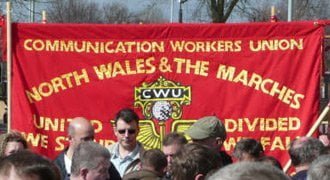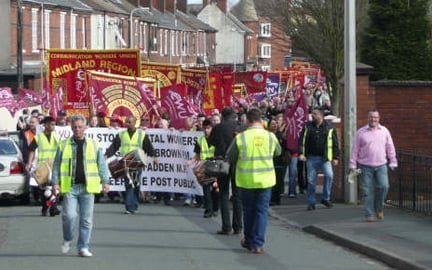 With repeated cries of “Royal Mail, Not for
With repeated cries of “Royal Mail, Not for
Sale” and echoes of the 1980s with “Mandy, Mandy, Mandy, Out, Out, Out!” more
than 1,000 CWU members and their supporters settled down in a meeting hall in
Bilston near Wolverhampton on Saturday afternoon March 14th to
listen to a range of speakers opposing the threat to privatise up to 49% of the
postal services.
The day had begun in the late morning
outside the Guru Nanak Sikh Temple in Arthur Street which had provided toilet
facilities, teas and pakora for the marchers. When the march moved off it was
preceded by three young Dhol drummers whose infectious Bhangra rhythm livened
up the mood of the marchers and drew the attention of Saturday shoppers in the
centre of Bilston as the march wound its way through the town centre to the
meeting hall.
Interspersed among the marchers were CWU
banners from all over the country, even from Scotland, North and South Wales as
well as a PCS banner. The march was therefore representative of the CWU members
nationally. On the march there were no police as the stewarding was done by CWU
local members. What a demonstration yet again of the ability of the working
class in action to organise itself and maintain discipline.
And
why was a national march held in Bilston, once famous for its steel works?
Bilston is the constituency of the Minister for Postal Affairs Pat McFadden,
who is assisting Mandy, Lord Peter Mandelson, to push through the privatisation
proposals. This march was the biggest in Bilston since 1979 during the campaign
to save the British Steel plant.
All of the platform speakers, including
Labour MP Geraldine Smith and Labour MEP Brian Simpson, lambasted the labour
Government’s proposals. With facts and figures both highlighted the record of
privatisation in higher prices for worsening services accompanied by massive
job losses in pursuit of profits and dividends for the new private owners. The
other speakers, ranging from local labour councillor Phil Page and regional TUC
official Roger McKenzie to CWU national leaders Bill Hayes and Tony Kearns, all
hammered home the same message – the crisis in the post office is not the fault
of the postal workers. Day in day out some 160,000 postal workers all over the
UK turn out in all kinds of weather to deliver the post and get paid a low wage
for the job, yet the head of the service Adam Crozier gets more than £3m per
year and is incapable of managing the service.
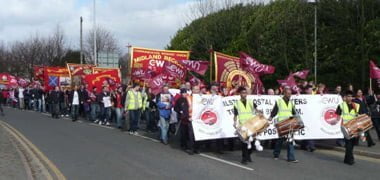 The loudest cheers and claps were for those
The loudest cheers and claps were for those
speakers who denounced the Labour government that was accused of breaking
promises to keep the PO wholly public -
promises that were made at the 2005 Labour Party Conference as well as at the
two meeting in Warwick where agreements were struck between trade union and LP
leaders.
CWU speakers recognised that there was a
problem with the pension fund, a problem affecting all pension funds except
that of the MPs, as pension funds had invested in the stock markets where share
values have fallen. That money, amounting to £bns, should now be paid back into
the fund. This problem is the government’s responsibility. It will not be
solved by privatisation. In addition, the employers’ side, that is the
government, had taken a 13 year pension holiday when the times were good. There
were also plans afoot and approved, with money available, to pay £280m per year
for 15 years, to rebuild the pension funds.
The CWU speakers outlined forthcoming
activities to build the movement against the privatisation plans. There were
already more than 120 Labour MPs who had signed an Early Day Motion to keep the
PO public. The next stage of the campaign would be to target those
constituencies where there were Labour MPs who had still not signed the EDM.
The problem with Mandelson is that he does not have a constituency as he is a
Lord, so his house may be targeted for demonstrations. The point was made that
some 92 unelected members of the Lords, who were there because of who their
father was and therefore have no “democratic mandate”, were discussing and
deciding on the fate of the post office.
The next phase of the campaign was a veiled
threat to ballot CWU members on the union continuing to support financially,
through affiliations, a Labour Party in government that is hell bent on
attacking the livelihoods and jobs of those who work in the PO. The credibility
of members with the Labour Government was being stretched. Speaker after
speaker could not understand how the government could believe the mantra that
“Private was Good, Public was Bad” when we are in the middle of the most
serious crisis in capitalism since the 1930s, a crisis caused by the so-called
“private enterprise” section of the economy. As one speaker said it was a
perverse sign of the times that the government had been defending PFI on the
basis that there was not enough public money available to finance public
projects, yet £bns had been found to bail out the banks. Even worse, PFI
bidders for public projects had been unable to raise funds in the capital
markets to make a bid and were now bailed out with public funds to help them
make these bids! What a condemnation of the bankruptcy of capitalism where it
can only survive with the support of public money.
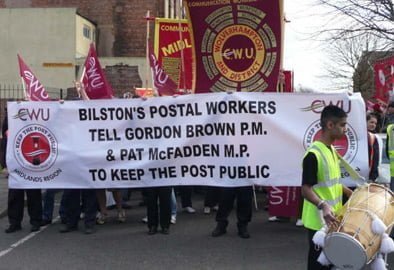 As regards CWU relations with Labour, the
As regards CWU relations with Labour, the
threat was made by CWU Deputy General Secretary in charge of Postal Services
Dave Ward that trade unions may put up candidates in the next general election
against Labour MPs who support privatisation of the PO. Rather than doing that it
would be more sensible and easier to get
CWU members into their local Labour Parties to deselect MPs that do not support
the campaign and then select candidates who do support the campaign? By putting
up opposition candidates it leaves the LP in the hands of the right wing
pro-privatisation leadership with a weakened internal LP opposition. Dave also
stated that strike action as part of the campaign could not be ruled out. His
words received a standing ovation that reflected the mood of those present.
The CWU will now expand the campaign to
mobilise public support against the government.
In the 1980s the CWU was at the forefront of helping other sections of
the labour movement to defend jobs. Now it was the turn of the CWU to defend
its own members’ jobs and it was calling on the rest of the labour and trade
union movement to help it do so.
But what will be the aims of that campaign?
Will it be to bring back in house those lucrative delivery contracts that have
been handed out to private firms like TNT? Will there be a call to take into
public ownership the private parasites that leech off public services? It must
not be to maintain the status quo of a public postal service with a management on
astronomical salaries that does not know how to manage, that is hell bent on
running the service into the ground? Would it not be far more sensible to fight
for a service that was controlled and managed by the workers in the PO and the
wider trade union movement? If workers in Venezuela can take over plants
threatened with privatisation or closure, and run those plants under workers’
control and management, why can’t the same be done in the PO?
As regards the financing of the PO would it
not be or sensible to nationalise the banking system to provide funds for a
programme of planned investment and development. Such a programme would mean
that improvements in productivity and efficiency in the service would not be at
the expense of postal workers jobs, but would be to make those jobs easier with
new technology leading to a shorter working week.
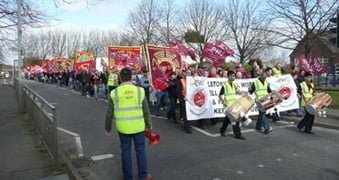 The CWU already has massive support in
The CWU already has massive support in
their fight. Most Labour MPs and 75% of the public are against these
privatisation plans. If the CWU loses, it will give the green light to other
planned moves to privatise public services under Labour. Not even the Tories
when they were in office would have dared to privatise the PO, but now Labour
might get their plans through Parliament relying on the support of the Tories! As the CWU goes into battle with the support
of the rest of the labour movement what will the role of the TUC? Will it be to organise and coordinate the
actions of the almost seven million trade unionists in the UK to support the
CWU and defend a publicly owned postal service? Will there be demands for a
one-day General Strike of all public sector workers to demonstrate to the
government the strength of feeling on this issue and to show to public sector
workers the organised power that they have once they take action?
The CWU is now in the forefront of the
battle to defend public services and is determined to win. It deserves the
active support of the whole of the trade union movement. As Dave Jones, Branch
Political Officer for Wolverhampton and District CWU, stated at the meeting,
“The government has picked a fight with the wrong people.”

